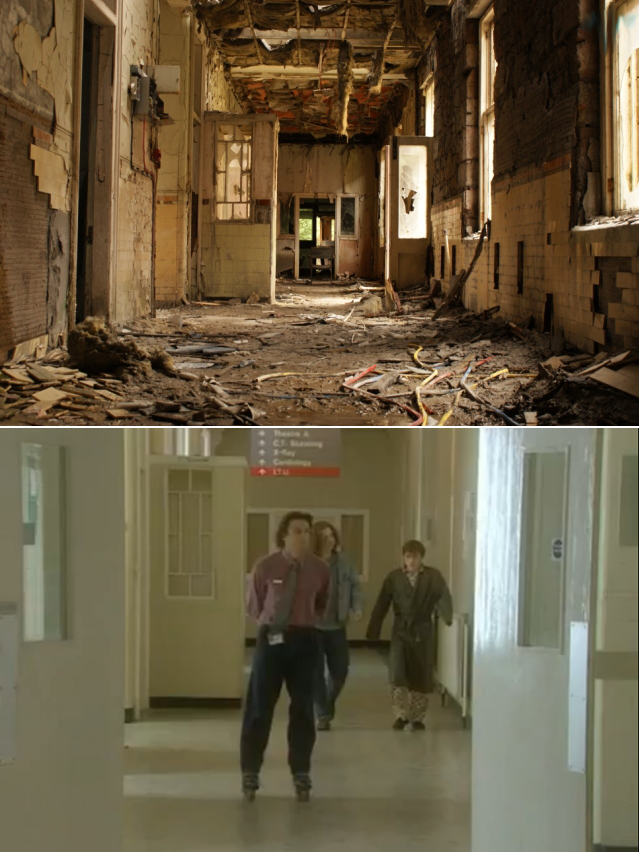This is something I did in May this year, then promptly forgot about. I noticed last week that scaffolding is now being erected around the tower, so I thought I'd stick this up incase any of you have, like me, ever wondered what it's like in the tower or looking out from it.
I need to get this rant out of my system first:
Ruchill hospital, designed in 1892 and opened in 1900, was one of two Glasgow Infectious Disease hospitals. The attractive Neo-Jacobean buildings, built of red brick and Locharbriggs sandstone, were given listed building status in 1992, partly due to the ingenious and unique way in which they were built in a coherent and symmetrical fashion on the steep gradients of the grounds.
There were originally sixteen ward blocks (with another eight completed by 1914) as well as the Administration Block, Enquiry House, Mortuary, Clearing House, Day Workers House, Stables, Laundry and Boiler House. Various additions were made throughout the years, but the positioning of the core buildings remained unchanged.
The hospital closed in 1998, and the site was acquired in 1999 by Scottish Enterprise. Scottish Enterprise immediately let the site fall into a terrible state of disrepair and, despite claims of 24 hour security, the remaining buildings were quickly stripped of lead and slate from the roofs, metal railings, and practically anything else of value. As a result, the condition of the buildings rapidly degenerated.
Although the majority of the buildings had an A, B or C listed status, Scottish Enterprise applied for complete demolition of the site. Although this was refused, they were allowed to demolish all but four of the original ward pavilions which surrounded the Water Tower, as well as other buildings such as the "White House", Boiler House, and Laundry.
Permission for this demolition was granted as it was felt it would not compromise the historical interest of the site and, whilst making it more of an attractive development site to potential bidders, it would ensure the "style design and context" was not lost when incorporated into any future developments.
Although it was a stipulation that the remaining listed buildings were to be incorporated into any future marketing and redevelopment of the site, Scottish Enterprise only carried out a bare minimum of maintenance on the remaining buildings, and it took them a further seven years after acquiring the site to actively market it for sale, by which time the buildings had reached such a terrible state of disrepair that the cost of incorporating them into any new development would have been exorbitant.
In spite of this, a private developer did come forward with ambitious plans for the site. However, Ruchill Community Council were keen to see social housing built on the grounds and, combined with the property downturn of 2008, this led to the developer withdrawing.
Scottish Enterprise again applied for demolition, claiming they could not afford to carry out any of the emergency remedial repairs outlined in a 2009 site report by Colliers CRE. This again was refused by the Council. However, an appeal was made to the Scottish Government, and the refusal was overturned.
Anyway, on with the pictures (Apologies for quality - I dropped my camera and damaged the lens as soon as I got into the tower!).
The Water Tower photographed shortly before the hospital opened in 1900:

Top five levels:

Some type of "thing" (generator/pump?) at the base of the beast:

This is where things got interesting. The stairs on the fifth level had started to disintegrate and collapse due to water ingression from the adjacent window. Faced with stairs that had the fragility of Balsa wood, and a gaping chasm which dropped 12ft down to the previous floor, I did something slightly scary, and possibly slightly stupid. But, hey... It's more thrilling than a day at Alton Towers. Cheaper too!

Onwards and upwards... One of the four huge water tanks:

The penultimate level. I've never actually been in a wind tunnel before, but I imagine this was a fairly similar experience.

The ninth and top level is the small, copper-topped octagon. It's flooded with a few inches of slippery, disgusting smelling water which is probably composed of putrefied dead pigeons. That, combined with a gale-force wind which seemed hellbent on thrusting me unceremoniously back down the access hatch, made it rather "not nice". Fortunately the views made up for it.
Looking down onto the Kitchens (and demolished Stores & Pharmacy), Ward 10 and the half-collapsed Mortuary. The ornate Enquiry Block, which sat to the left of the Mortuary, has also been demolished:

Looking East, with the Red Road flats (pre demolition) visible at the far left:

Looking towards the city centre with Forth & Clyde canal, Firhill stadium and the landmark towers of Trinity College and Park
Church in the Woodlands area of the West End visible:

Looking North West - The Administration building is in the foreground, now cut-off from the rest of the hospital site by the access road for the new school built in the adjacent park.

Looking North East - The Campsie Fells can be seen far in the distance:

Thanks for looking.
















